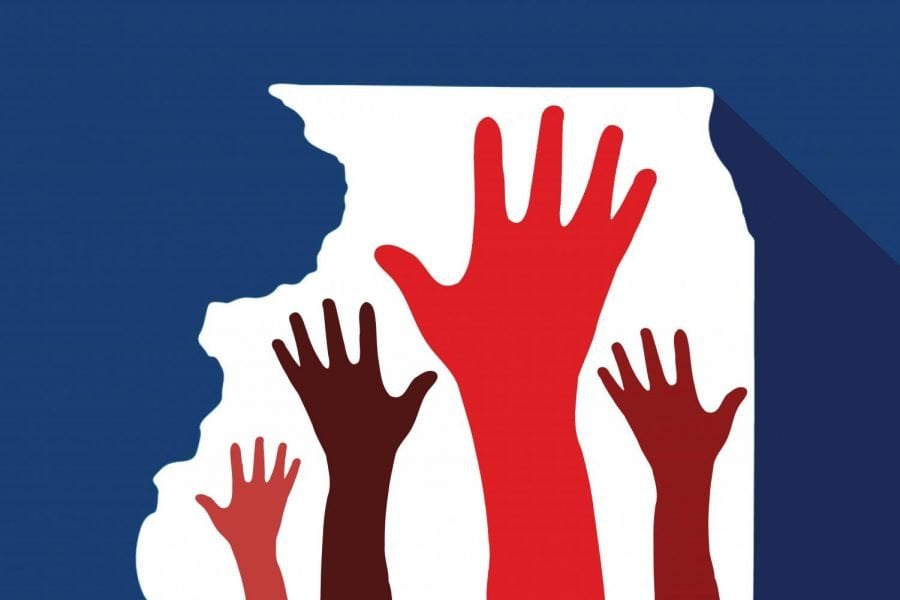Evanston Voter Initiative aims to land direct democracy proposal on the ballot this summer
Illustration by Catherine Buchaniec
Evanston Voter Initiative hopes to give citizens a voice in local government.
February 9, 2022
In 2019, Evanston residents launched the Evanston Voter Initiative, a grassroots effort attempting to give voters a direct voice in local politics.
While the initial push for a voter initiative process was struck down in early 2020, community members hope they can get it back on the ballot during state primaries this June. A voter initiative process would give residents the opportunity to introduce issues directly on the ballot, without City Council voting on it first.
Initiatives in states like Washington and California have given citizens the opportunity to raise the minimum wage. Other initiatives could grant universal early childcare or universal basic income, Allison Harned, a founding leader of the initiative, said.
While the process of gaining the right to initiative has proven difficult, getting an initiative itself on the ballot is as well. To create an initiative, community members must file a preliminary report of their petition with a city official for review. After the initiative is approved, the petitioner must gather signatures. The petition can be placed on the ballot after a certain signature threshold, which varies by population size and local government language regarding initiatives, is met.
Some community members are looking to get a voter initiative process on the ballot this April. Harned said the idea for a campaign first arose in the 2018 Harley Clarke mansion debate. She said a poll with an 80% vote from residents to save the house from demolition pushed City Council to vote against demolition.
After this vote, Harned said former Gov. Pat Quinn contacted then-City Clerk Devon Reid to create a voter initiative campaign in Evanston.
“We wanted this to exist because we were feeling like City Council wasn’t listening to us,” Harned said. “We wanted to have a way for the people to have proof that the people in town feel a certain way about a topic.”
More than 3,000 Evanston residents signed a petition from June to December of 2019 to institute a voter initiative process. But Harned said some councilmembers, including former Mayor Steve Hagerty and former Ald. Ann Rainey (8th), both later struck down the proposal in an electoral board meeting.
Just one week after submitting the petition to the city, Harned said the campaign received notification of objection from the city government, which denied the petition’s legitimacy. Harned said the Evanston Voter Initiative team decided to take the issue to court following Rainey and Hagerty’s vote to strike the proposal.
“There was a lawyer that the city hired and the decision seemed to have been preordained by the councilmembers,” Harned said.
Harned said the campaign was ultimately struck down when it reached appellate court. The court ruled that citizens could not put an initiative proposal on the ballot and instead would have to get City Council to propose and approve the initiative proposal before it could be on the ballot.
Quinn contributed to several voter initiative campaigns across Illinois following his term as governor. He said a life of politics has taught him the importance of giving people a voice.
“The people at large often have creative ideas,” Quinn said. “A lot of the initiative process is not only getting something on the ballot and voting on it, but a petition drive or an idea often gets the officeholders to pay attention.”
Quinn is working with Harned to get a voter initiative process on the ballot and said he remains hopeful that the community will organize in favor of the initiative.
Mayor Daniel Biss said community members have the power to influence City Council at an event last November hosted by Community Alliance for Better Government. He added Evanston residents could use that power to push for an initiative process.
“Resident groups and interested residents in Evanston are extremely effective at getting the attention of elected officials,” Biss said.
Despite what Quinn called “bureaucracy getting in the way of progress,” he said he believes a voter initiative process is beneficial to democracy as a whole.
“It’s the only way to get vitality into our democracy,” Quinn said. “Allowing voters to petition ideas and vote on them is very healthy for democracy.”
Correction: A previous version of this article misstated the month of the election. State primaries will occur in June, not April. The Daily regrets the error.
Email: katherinemcdonnell2025@u.northwestern.edu
Twitter: @KatherineMcD33
Related Stories:
— Evanston Voter Initiative loses suit against city and objectors
— Electoral Board sustains objection to Evanston Voter Initiative
— Electoral Board postpones objection hearing for Evanston Voter Initiative


